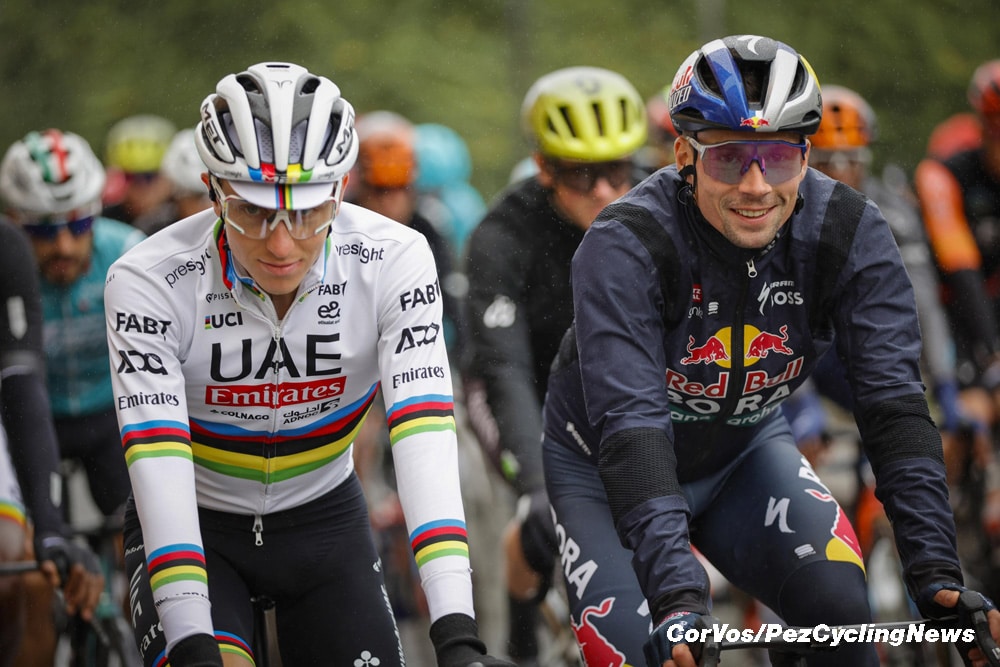
In this week’s AIRmail newsletter, The Outer Line takes an in-depth look at trending cycling news: Other sports take lenient approach to doping, end of amateur sports? Tour of Colombia “postponed,” cycling’s haves and have-nots, more controversy over race safety…..
# Catch up on pro cycling – and its context within the broader world of sports – with AIRmail … Analysis, Insight and Reflections from The Outer Line. You can subscribe to AIRmail here, and check out The Outer Line’s extensive library of articles on the governance and economics of cycling here. #
Key Takeaways:
- Tennis Takes a More Lenient Approach to Doping
- The End of Amateur Sports?
- Tour of Colombia Off Again
- Is Cycling Growing – Or Is It Just a Few Teams?
- More Controversy over Race Safety and Radios
Tennis star Iga Swiatek’s recently announced doping case is the third high-profile one to impact the sport in recent years, and it illustrates a strong contrast between that sport and professional cycling. It could also be a turning point for tennis’ anti-doping agency, the ITIA. As with the other cases – Simona Halep (blood-booster Roxudustat) and the world’s top player, Jannik Sinner (anabolic clostebol) – Swiatek’s finding for a banned heart medication (trimetazidine – the same drug in the Chinese swimming controversy) was kept silent for a short administrative period before being made public. Unlike Halep, who was banned from competition during the case adjudication, Swiatek joined Sinner in earning “light treatment” for what is considered a heavy offense in sports like pro cycling: a judgment of no-fault due to a presumed and inadvertent cross-contamination exposure to the banned substance, with a “credit for time served” during the adjudication process, allowing the athlete to immediately return to competition.

But cycling has the reputation
However, the cross-contaminant defense is becoming less believable over time, as it gets recycled in ever more fantastical configurations – especially given the WADA code burden on the athlete to be aware of anything they put in their bodies. Halep may have a legitimate beef with the WTA and ITIA based on the presumed leniency shown to Swiatek, although Sinner’s case might earn a punishment in an upcoming CAS appeal. But it all begs the question for professional sports – when is detection and punishment of a doping positive good for the sport’s integrity but potentially bad for the sport’s business interests? And which direction should the sport take? Tennis seems to be taking a much more lenient approach than cycling, yet cycling continues to suffer a poor reputation on the global stage.

1979 Valkenburg, when there was still amateur World Championships
An unfolding saga we’ve been commenting on all year is coming to a conclusion shortly, and barring any late changes to the House v. NCAA legal case, the Olympic ideal of amateur elite athletics will be over. Currently, NCAA schools are providing their feedback on the proposed settlement from October 7, but many institutions are already preparing to pay athletes a portion of the media rights the schools earn from broadcast deals, including the multi-billion dollar earnings from football and basketball. Whereas Name/Image/Likeness (NIL) deals could be treated as individual payments to athletes within an amateur/elite sporting governance model, House v. NCAA will also see the athletes reclassified as employees of the schools – professionals in the service of the institutions they represent in the stadium. Thus, when the case is settled in final agreement, one of the Olympic model’s largest athlete development pools will have greater standing to demand direct remuneration for competing in the Olympics. Whether this is expressed as demands from national Olympic committees, like the USOC, or potentially as collective action in specific sports from the IOC itself, it seems inevitable now that the IOC’s business model will be disrupted by athletes who may eventually be able to lay legitimate claim to a portion of the Games’ media rights. Given the steady march of athlete legal standing and labor rights, a lot may change before the 2028 Olympics – stay tuned.

The Tour Colombia missing in 2025
Bittersweet news hit pro cycling’s calendar when it was announced by race organizers that the Tour of Colombia would not be run in 2025 and – after missing several editions during the COVID crisis – one has to wonder about the future of the race. While the Colombian cycling federation said that funding would instead be used for talent development, the postponement of its venerable and respected stage race – arguably, the crown jewel of the South American calendar – is fraught with peril for pro cycling. First, it is rare for a race to return to the calendar after a funding shortfall “postponement” – as we’ve experienced with the Tour of California, Colorado, and Alberta, to name just a few. The costs to stage a road race keep accelerating in a sport that struggles to make ends meet given its sponsorship-heavy financial model. The second impact is the lack of exposure to professional bike racing in a key cycling market; fans are deprived of the product and the sport loses engagement opportunities with new fans. This negative feedback loop of less exposure fueling lower participation has been a factor in the downturn in licensed U.S. racing. We hope that Colombia’s tour organizers have a plan to right the race’s ship, and if they do, hopefully that might provide feedback to the rest of the sport, helping to perhaps keep other endangered races afloat in the future.

More money than ever in cycling… for some
Amidst the news of multiple professional races and teams folding, particularly in previously strong markets like the United Kingdom and the United States, one could be excused for wondering if the sport is struggling at the highest level. However, a recent report from La Gazzetta dello Sport apparently suggested that the cumulative budget for the 18-team Men’s WorldTour will be €570 million heading into the 2025 season, with the average rider salary creeping up to €500,000 – a 33% increase from 2022. Meanwhile the 15-team Women’s WorldTour budget increased 100% over the same period and now sits at €70 million. These estimated figures demonstrate an upward trend in rider pay but also highlight the growing gulf between the men and the women, as well as the haves and have-nots in both sports – and will only make it more and more difficult for upstart programs to break into the top tier. For example, at the men’s second professional level, the UCI’s ProSeries, the total budget has grown 50% since 2022, from €99 million to €149 million, but the relatively high-budget teams like Israel-Premier Tech, Tudor, Lotto-Dstny and Uno-X likely constitute the bulk of that figure. In addition, with a few teams like those, relegated from or once part of the WorldTour, the bar is significantly raised for any team looking to either score a promotion to the WorldTour, or even pick up wild card invitations. This increase has certainly increased the price for talent with the raw physical ability to win races in modern cycling, and has made it increasingly difficult for legacy teams, who often rely on the support of regional sponsors like Soudal-QuickStep and Cofidis, to afford race-winning talent. It remains to be seen if such “medium-budget” teams will continue to plow significant resources into a sport where a small handful of well-funded outfits – which own all the top talent – continue to increase their budgets.

Could/would Red Bull and UAE pull out tomorrow?
There is – and always has been – well-deserved skepticism about whether salary growth is truly sustainable or just the result of a few wealthy individuals and organizations pumping massive amounts of money into the sport, which could be reversed at the drop of a hat. Parties like RedBull, the government of the United Arab Emirates, or Jim Ratcliffe could one day lose interest in the sport. This is certainly a logical concern, and risk of sudden rider market deflation due to a few influential individual sponsors suddenly pulling out isn’t impossible. On the other hand, it is worth pointing out that while a few teams have benefited from an apparent “blank check” type of owner, others have significantly increased their budget by commanding market sponsorship rates from international firms, like Visma, Decathlon, Alpecin, Lidl and Canyon – who presumably have tighter and more defined financial return requirements.

Sport needs those sponsors
While cycling is far more dependent on sponsor revenues than most sports, it is also true that other sports face other and different kinds of risks. For example, major U.S. sports leagues like the NBA and MLB are burdened with absurdly high (and growing) salary structures and rely heavily on increasing TV deals, which, in turn, rely on the exorbitant carriage fees that pay-TV providers receive from cable companies. Some leagues, like the NFL and NBA, are extending their media rights into foreign markets to cover the difference. Meanwhile, many of the cable companies are struggling to fork over these fees, due to the ever-crumbling cable TV bundle; this fragile ecosystem creates not-insignificant risks for many teams. The implosion of regional cable affiliates, in particular, has left smaller market franchises – many of whom already operate at a loss – at risk of losing what has historically been a valuable revenue source.

Christian Prudhomme making provocative comments
At the recent AIOOC meetings – of pro cycling’s race organizers – Tour de France director Christian Prudhomme made provocative comments about race safety – again suggesting that the riders are primarily to blame for the risks. “The faster they go, the greater the risk and the greater the danger to themselves and others,” he reportedly said. As has happened in the past, this response enraged some of the teams, in particular EF Education-EasyPost boss Jonathan Vaughters, who said he was tired of commentary from “fat cats who have never raced so much as a child’s tricycle.” The topic of race radios also was raised again – another controversial issue – which it appears the UCI is in favor of banning, while most teams fall on the other side of the debate. The UCI apparently believes that removing radios would level the playing field and make the racing more exciting, while the teams believe they are critical to safety, as well as race tactics. Many riders have pointed to the recent death of Muriel Furrer at the World Championships as very clear evidence of the need for riders to have radio communications – and the need for consistent GPS and potentially crash sensors as well. For safety’s sake, more technology may be a better answer than reducing the safety net such devices provide in the heat of competition.

# Catch up on pro cycling – and its context within the broader world of sports – with AIRmail … Analysis, Insight and Reflections from The Outer Line. You can subscribe to AIRmail here, and check out The Outer Line’s extensive library of articles on the governance and economics of cycling here. #
The post Doping, Amateur Sports? Tour Colombia Postponed, Cycling’s Haves and Have-Nots, Race Safety ….. appeared first on PezCycling News.




